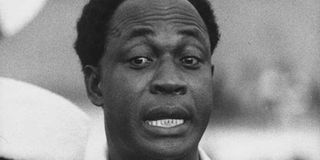Let’s reclaim dream of Pan Africanism

Kwame Nkrumah. It was his endeavours that led to the founding of the Organisation of African Unity with the twin objective of anti-colonialism and continental unity. PHOTO | NATION MEDIA GROUP
What you need to know:
It fell into the hands of subversive leaders who used its premise to reinforce the very injustices they were supposed to fight.
These leaders will comfortably watch us die of hunger, use us as collateral damage, incite us against each other and sell our dreams cheap in the name of non-interference.
We need re-imagination into what our roles are in the current African context where tribe, class, religion, patriarchy and xenophobia still exist and be part of a different narrative.
I've seen, read and heard unimaginative conversations about what Pan Africanism meant for Africa and wondered how small we've reduced the vision of this ideology. Foremost, Pan Africanism is a political ideology— in a simple and direct sense—aimed at the unity of all people of African descent. It has a long history of women and men who imagined a united African continent free from “whiteness” as a supreme culture of reference.
BROADER SENSE
In a broader and more complex sense, Pan Africanism was/is supposed to centre African people as custodians in shaping their own path — a path that was violently interrupted by slavery and colonialism. Politically, Pan Africanism is about seeking and exercising accountability by using the rule of law when governing.
Economically, Pan Africanism was to build intra-Africa trade mechanism that makes it possible for people to move— both themselves and their goods — with ease. It was to enable accessibility, expansion and strengthening of markets by reducing our vulnerabilities to foreign markets. It was to make Africa the heart of global trade with our endless raw materials, dynamic population and infinite possibilities.
Socially, Pan Africanism was to re-introduce Africans to themselves after going through years of traumatic struggles in search of independence.
HIERARCHIES
It was to teach us how to see ourselves from lenses that belong to us and from a place of empathy. It was to link our struggles and show their interconnectedness by breaking down hierarchies of xenophobic conditioning.
We were to begin seeing ourselves as humans and not slaves or lesser people who deserved to be keepers of each other. Yet unfortunately, Pan Africanism-like any ideal with the ability to reinvent and mould mental freedom— which is the greatest struggle — got hijacked.
It fell into the hands of subversive leaders who used its premise to reinforce the very injustices they were supposed to fight. These leaders continue to restrict the movement of Africans.
NON-INTERFERENCE
These leaders will comfortably watch us die of hunger, use us as collateral damage, incite us against each other and sell our dreams cheap in the name of non-interference.
What then does Pan Africanism mean in an Africa that remains segmented? Well, it means we need to collectively become the new visionaries, dreamers and believers who'll reclaim this vision.
We need re-imagination into what our roles are in the current African context where tribe, class, religion, patriarchy and xenophobia still exist and be part of a different narrative.
We don't have a choice neither do we have the luxury of time because living in isolation will do nothing but make us easy prey for foreigners who'll always thirst to dominate us.
Scheaffer Okore is a Policy analyst; [email protected]





